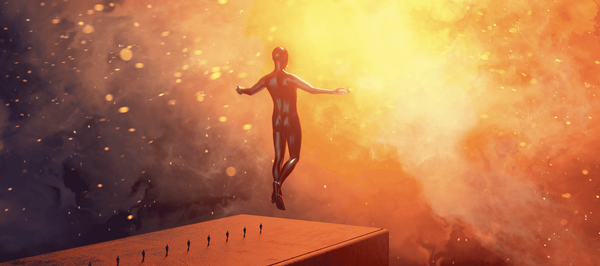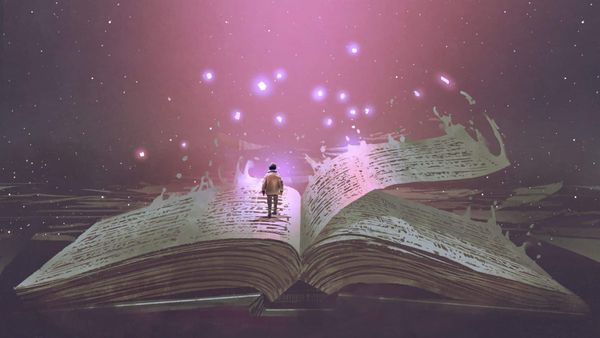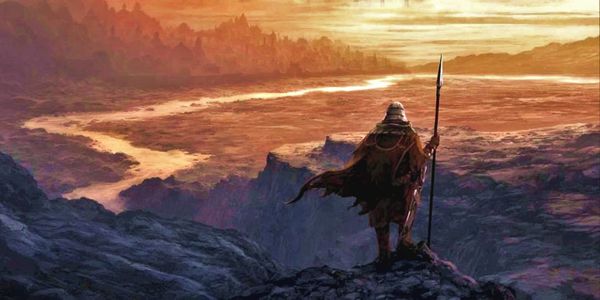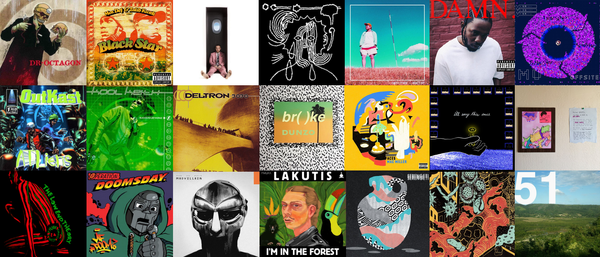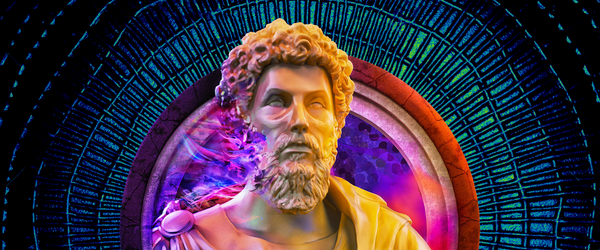Ronan Loughney • • 11 min read
Following the Winding Road to Truth: Why Tradition is a Guide to be Left at the Door of Self-Discovery
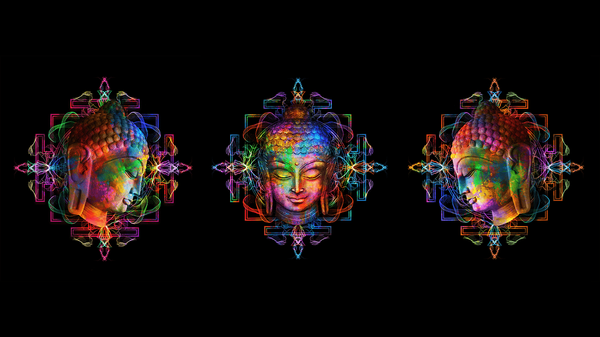
When we first immerse ourselves in the ‘spiritual life’, it is easy to start to feel as if anything that does not pertain directly to this realm is a waste of time; to begin to look upon the machinations of the external world and all its material preoccupations and technological advances as some illusory, or certainly lower, realm.
But in fact, this perspective is the illusion: the idea that spirituality only pertains to inward or religious life. To be spiritual is rather to recognise spirit in everything. And because this spirit is ineffable, ‘of’ and ‘in’ but also ‘behind’ and ‘between’ things, it is also to maintain a constant humility, curiosity and openness, understanding always: ‘I do not know’.
When we follow this understanding, we can come, paradoxically, to a deeper, more personal kind of knowledge. Here is an account of my own exploration of not knowing and where it took me. I hope it sparks your own.
Down the rabbit hole
I was doing some spring cleaning on my computer and came across an old folder tucked away somewhere, forgotten. It contained various books related to spirituality I’d downloaded in a flurry of naive inspiration which, after having congratulated myself on my initiative, I had of course forgotten or ignored ever since.
Browsing through the titles, one immediately caught my eye – Prometheus Rising, by Robert Anton Wilson. The name winked at me suggestively from the screen, in that way which tells us that something in the universe has sought us out (rather than the other way round, i.e. how we commonly perceive our experience).
![[Image from https://www.abebooks.co.uk]](https://www.highexistence.com/content/images/isbn/9781561840564-uk.jpg)
It conjured up notions of myth, progress, resurrection, truth; promises of recondite knowledge and magic. It was fitting, looking back, that my computer had provided the seed of my spiritual insight, a symbol that spirituality and technological progress are not opposed, but interlaced in the same manner as everything else. Having opened the first page, I did not put it down until it was finished.
Written in the 1980s, the book is essentially a futurist foretelling of the coming of the Übermensch (Superman), based on humanity’s continued development along the lines of Timothy Leary’s Eight Circuit Model of Consciousness.
My purpose here isn’t to explore its contents (although I highly recommend you do). Rather, it is to give an account of how a chance exposure to a forgotten piece of esoteric 1980s futurism jolted me out of my spiritual complacency and reminded me that we are never finished learning; how, by following the breadcrumb trail sprinkled before me by the universe, I broke out of an entrenched way of thinking in a moment of subtle catharsis.
Through mapping my own odyssey of mind and heart, which took in everything from Buddha to Elon Musk and back again, I want to show how the mind can make connections between apparently disparate concepts to enter upon new insights; how we never know what trail in the maze will lead us out of it.
If you’ll indulge me in this age of fragmented attention spans and instant gratification, I’d like to take you on my winding, tangential journey, to reflect the ways in which insights come to us, as if from nowhere. As if we were guided there.
Spiritual Conservativism
In the book, Wilson is dismissive of all definitive viewpoints, which do not consider their own inherent subjectivity and therefore incompleteness in the context of the ever-shifting complexity of the world and everything within it. He then goes on to lampoon them for their criticism of that which appears to usurp traditional human values. He mocks Stoicism as a fusty, po-faced over-insistence on the essential difficulty of life. He pokes fun at the close-mindedness of the world religions for concluding that death comes to us all and that we had best make peace with ourselves/God before then. Essentially, he laughs at anyone for thinking that they know anything that they think they know, with all of the attendant caution, hubris and pointless self-deceit that results.
![[Image from https://newrepublic.com/article/156266/neocons-strike-back]](https://www.highexistence.com/content/images/5af21400798ce733daab6a99c08b5985bb235b14.jpeg)
He identifies the figurehead of such neo-conservatives as Tom Wolfe, which may seem surprising, as Wolfe wrote the Electric Cool-Aid Acid Test, a kind of Gonzo-style account of the adventures of Ken Kesey and the Merry Pranksters, the pioneers of the West Coast acid revolution of the 1960s.
But Wolfe was also the author of The Bonfire of the Vanities, the book which satirised and exposed the rapacious materialism of the 1980s and the dawning of the neo-liberal economic era like no other, and A Man in Full, another satire of a ‘self-made’ alpha-male who ultimately finds his life’s true meaning by renouncing all of his possessions and discovering Stoicism. It was the perspectives in these books with which Wilson was taking umbrage.
Doubting what we know
I’d always liked Wolfe, and sided with his criticism of the selfish materialism at the heart of modern society. And so I noticed myself bristling at the mocking tone Wilson was adopting. Of course, reacting to criticism, especially when it isn’t even directed at us, is a sure sign
an aspect of our shadow is being called out, and so I attempted to understand what he was getting at.
I realised that, behind Wolfe’s and my own denigration of greed and materialism, lurks a resentment of the heights to which individuals can soar when they shed themselves of shame before the masses, the sheepish instinct which keeps us safely tethered to mediocrity. (What Nietzsche would have called Slave Morality or the Pity Instinct.)
![Friedrich Nietzsche’s Guide to Conquering Your Existence [Image from https://www.creativitypost.com/article/friedrich_nietzsches_guide_to_conquering_your_existence]](https://www.highexistence.com/content/images/creativity-post/uploads/_articleBody/ubermensh_by_mathiole-d2y5yjr.jpg)
Indeed, more contemporary philosophers of sovereign individuality such as Ayn Rand have on occasion explicitly equated greatness in the modern world with money, since it has become the fundamental measure of value, where everyone recognises and is under the influence of its power. This doesn’t mean that greatness is money, but rather that part of all of us understands it as such, and so any aversion to those who have amassed fortunes is often at least partially tinged with resentment and jealousy.
This type of neo-conservatism is everywhere within spirituality, where ‘real’ spirituality and moral virtue is equated with humility and tradition, ascetic values etc. Indigenous communities are attested to be the custodians of an all-sufficient knowledge in a way that reeks of Rousseau’s Belle Sauvage, an idealised portrait of ‘original man’ in all his unsullied perfection.
Techno-spirituality
Through this lens, technology is viewed as a pernicious abstraction from the world as it is, from nature itself. It is something to be wary of, guarded against and held back, whose aim is merely further generation of wealth or, at best, the relentless pursuit of more superficial pleasure, as opposed to the deeper callings of the human soul.
Nature (the domain to which spirit, as its purest form and expression, belongs) is equated simplistically with (certain) processes of the natural world, as opposed to merely the unfolding of whatever is, in a way that is self-serving and simplistic (e.g. on this view it is ‘natural’ when beings cooperate and support one another but unnatural when more selfish drives kick in).
I had long been one of these grumbling anachronists, muttering that the ‘progress’ that has been made in modern times is nothing but a superficial ego-projection, an external window-dressing, when the only type of change that really means anything is internal; that all technology could ever achieve was an amplification of the internal contradictions within the human psyche which give rise to that technology, and so never solve or help us move beyond any of our problems, which are only ever psycho-spiritual anyway.
I had harboured such a perspective for as long as I can remember, certainly since beginning to identify myself as ‘spiritual’ (which of course was my first error, all stereotyping representing the death of original, independent thought). But now, for the first time, I began to have doubts.
Apparently incidental tangent #42
![The interview: Slavoj Žižek | New Internationalist
[Image from https://newint.org/features/2019/02/11/interview-Slavoj-Zizek]](https://www.highexistence.com/content/images/sites/default/files/2019/Slavoj-20Zizek-20photo-20surprised.jpg)
I had also recently read Zizek’s Hegel in a Wired Brain, which considers the ethical, spiritual and existential ramifications of Elon Musk's neural link becoming a reality. Reflecting on it, I realised that one of its implications is that, in the not-too-distant future, life as we know it could be so different from now that many of the ancient truths upon which our spiritual traditions are based would no longer hold.
In a world where there was no longer death, no corporeal existence, no differentiation between the sexes or one another’s subjectivity (such a total merging potentially sublimating the eternal spiritual division of masculine and feminine, not only through the merging of men and women but through the elimination of chaos/unpredictability – i.e. the feminine archetype – through total transparency/unity of mind), would the ‘eternal truths’ of our spiritual traditions still be relevant?
Eternal truth 2.0
For example, two of the major religious ideologies adopted by the western spiritual seeker of the modern day, Buddhism and Christianity, are both based on the notion of the inescapability of suffering. In Christianity, we are redeemed from suffering (experienced as separation from God) by way of the creator’s own sacrifice, and in Buddhism, through accessing Nirvana, the transcendence of the temporal plane of suffering.
But if we are never bored, and never dissatisfied, if we in fact unify to become something like the godhead itself, might it be that we transcend suffering, or certainly anything that we could recognise as such? And if there were a possibility that suffering were no longer a thing – either because there was no longer a subject to suffer, or total hedonic satisfaction became somehow possible, or simply the problem-solving capacity of the post neural-link hive-mind was such that suffering was eradicated in a way unimaginable to us now – should we not accept that these tools (for that is all they are) have outlived their usefulness?
The irony is that Buddhism itself recognises the contingency of all truth, and bears within its own tradition the supervention of its original doctrines, updating the Buddha’s teachings for a new time and culture. Whilst the Buddha allegedly attested to Three Universal Truths (Anicca – Impermanence, Dukkha – Unsatisfactoriness, and Anatta – No-Self), the Heart Sutra, originating between 500-1000 years after his death, states that the only truth is that ‘Form is no other than emptiness, emptiness no other than form.’
We learn from the past so that we can move beyond it
The heart sutra formulates what is known as the Law of Dependent Origination and states that nothing has an existence or nature independent from everything else, and yet a ‘thing’ (any experiential node/phenomenon within infinity) can be said to have its own nature as a unique point of convergence of everything with which it is interconnected.

This can be exemplified in the Hindu metaphor of Indra's net, an infinite web with infinite nodes along it, upon each of which a jewel is placed, each reflecting onto one another the reflections of all the other jewels, ad infinitum.
Or, imagine a hall of mirrors, each mirror reflecting infinitely an image of all of the other mirrors off of one another. No single instance of reflection can be considered separately from the others, and yet any perspective within the endless array of reflections will be unique, based on its composition by the other reflections.
The sutra then goes on to explain that, because phenomena are essentially empty, there is no final reality – no wisdom, no truth. Even the Law of Dependent Origination is not an ultimate truth because, presumably, a world capable of such a degree of self-reflexivity and reflectivity can thereby transcend its own structure. (Remember, the image of the web is just an image, not the thing itself). This radical, meta-emptiness thereby leaves behind infinite potential in the nihilistic void that is (and also, isn’t. Sort of).
Although people resist the conclusions of nihilism, this is based on a naive belief that nihilism is bad; that it is somehow evil or terrifying. But nihilism is not negative, since the very concepts of negative and positive can only exist in a value-orientated universe, one in which one thing is better than another. Nihilism states that, ultimately, there is no such value. Neither is nihilism really neutral though. Because the void is merely a space which gives rise to whatever fills it. Nihilism is not a conclusion but an opening, and it is through this opening that the Übermensch Robert Wilson is inviting us to re-imagine may come to create the world that is fit for itself.
If we follow the ancient religions to their heart, they all arrive upon this emptiness which is simultaneously everything. This is both God as well as the self, the ultimate origin from which all things come, the awesomeness which cannot be beheld directly from the current plane. If we are being truly spiritual, this is where we reach, passing by the stabilising and fixed footholds of tradition along the way.(It may seem ironic/self-contradictory to invoke spiritual teachings as a means of saying we should move beyond them, but the unique brilliance of the Heart Sutra is that it is the teaching of all teachings, the meta-teaching, whose conclusion is a moving beyond itself. It essentially says: the only rule is that there are no rules, and even that’s not a rule. Have fun kids!)
From Conservativism to Being
And so, to attempt to tie my odyssey of thought back together, I realised that any static, humdrum, limiting perspective I had on spirituality was fundamentally flawed, limited by a superficial understanding of what spirituality really is, forgetting that spirituality calls us to live rather than simply to conceptualise truths about it.
I realised that I had held onto concepts out of fear, clinging to some stability in the ever-churning bedlam of life. That for this reason and not out of any understanding of how the world really works, I had dismissed any attempts to go beyond the trappings of the human condition as unnatural, or somehow fascist, as if such bio-engineering were the exclusive preserve of the Nazis and the other Machiavellian eugenicists of the early twentieth century.
I realised that all this time, while rejecting it intellectually, on an experiential level I had been considering humanity as the ‘end of evolution’ in the outdated, modernist sense, and that anything beyond our current reality was either a corruption or a lie. But humans are just the results and conduits of an ancient and eternal dynamic force from which all things come and which sustains all things. (Indeed, thinkers such as Ken Wilber believe that the universe is actually being injected with more spirit as time progresses).
This type of superficiality is what is lurking behind all ‘neo-conservatism’ in spirituality. It is what leads to the clinging to the past, to the idea of humanity for humanity’s sake, to tradition and convention. Of course, we still have so much to learn from our great traditions, but only insofar as they can help us build a new reality.
Without even realising it, by clinging onto beliefs as if they were necessary truths, we limit ourselves at every step. We tell ourselves that we cannot do this or that; that happiness is only attainable through meditating for five hours a day; that free will does not exist because it is logically inconsistent (so why bother trying?); that truth is the preserve of someone else, somewhere else, unattainably far away.
As Socrates said, ‘All I know is that I know nothing’. The greatest teachings persist, ironically, because they tell us to go beyond them. They persist because they are empty, and so allow us to mould them repeatedly to the changing shapes of our lives. Again, being truly spiritual is not about clinging stubbornly to the hand-me-down truths of the past, but rather to bear witness to the full scope of reality, beyond all propositional truth, which is just an abstraction.
And so do not despair in this void of total blindness we find ourselves in, but rather remain forever open to the infinite potential of the present. Be glad that the truth is not fixed and dead, but a living, dancing reality, which we form through dancing with it.
Ronan Loughney
Ronan is a trainee-Psychotherapist, MDMA Guide and Coach. You can reach him via www.ronanloughney.com or email him directly at ronanloughney@gmail.com

